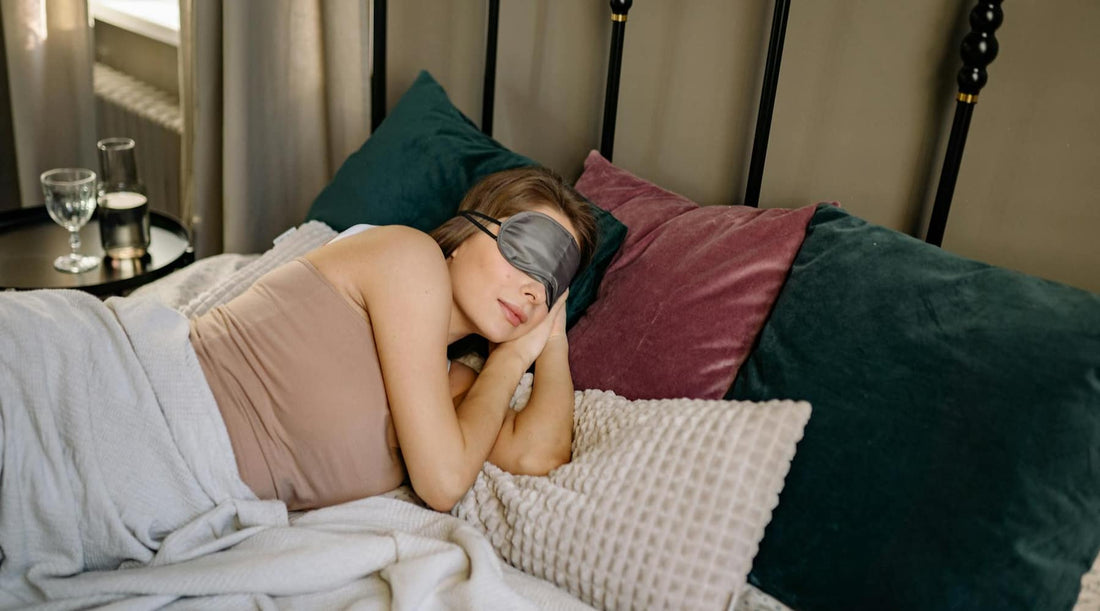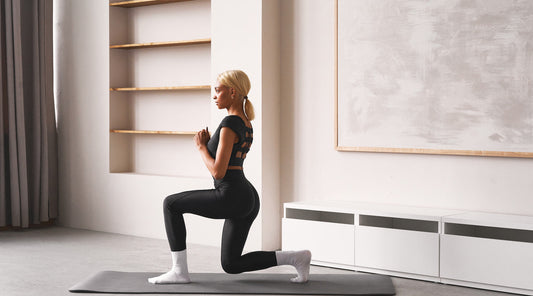You can have a squeaky clean diet and regular exercise routine, but if you sacrifice your sleep you are putting your physical, mental, and emotional well-being at risk. Sleep deficiency can impact your focus, slow down your productivity, increase anxiety, and even affect your posture. Studies have found that chronic poor sleep quality impairs postural control, and it can deteriorate after just one night without sleep. Chronic sleep deprivation can lead to even greater health problems, including heart disease, kidney disease, diabetes, and depression.
How you approach sleep deeply impacts every aspect of your waking life. About a third of American adults sleep less than the recommended minimum of seven hours per night, and if you’re like half of the American population, you likely feel sleepy on most days.
If you find yourself tired, slumped over, unable to focus, and far from “living your best life,” it’s time to start prioritizing your sleep. Here are six healthy sleep habits and plenty of tips to help you get a good night’s sleep and stand tall and confident the next day.

1. Stick to a consistent schedule.
Our bodies crave routine. They operate best on the strictest of schedules thanks to our natural circadian rhythms. These 24-hour cycles dictate major bodily processes, including appetite and digestion, hormonal activity, and sleep. When it comes to a person’s sleep-wake cycle, the environment plays a crucial role. Simply put, light exposure encourages alertness, while darkness drives the production of the sleep-promoting hormone melatonin. Generally speaking, your mind and body are best attuned to be active with the sun and sleepy with the moon.
Of course, our modern lives tend to clash with this primordial system. Any and all distractions—work, travel, kids, friends, pets, screens—will keep us from sticking to such a synchronized schedule. However, you can strive to align this cycle by going to bed at the same time every night and waking up at the same time every day. Try to fight the urge to “sleep in” when you have a day off so as to not disrupt this routine. Even if you work night shifts, you can still keep a consistent schedule.
Bonus tip: Set a daily alarm to remind you to get ready for bed, not just to get out of it!

2. Pick at least one daily ritual to help you unwind before bedtime.
Your regular sleep schedule should also include a few calming rituals to ease your mind and body into a relaxed state. Think about winding down at least one hour before bedtime. Here are a few ways to decompress:
- Decrease light exposure. Dim the lights and set aside—or better yet—shut off all electronic devices. Evening light exposure, especially bright artificial light, blocks the production of melatonin, an important sleep-inducing hormone.
- Take a hot bath. Light some candles, draw a bath, and include a few drops of essential oils like lavender or frankincense to help induce further relaxation.
- Meditate. As a relaxation technique, meditation has been shown to increase melatonin concentration and improve sleep quality. If you’re a newbie, try meditating for just 3 to 5 minutes before bed. You can slowly increase that time the more you feel comfortable with the practice. You can meditate either sitting up or lying down. Close your eyes and focus on your breathing. If your mind starts to wander, take note of it and refocus on your breath.
- Read. Settling into a good book comes with enormous benefits. Reading for half an hour can be just as much of a stress reliever as yoga. Just try to avoid reading on a light-emitting tablet or smartphone.

3. Move your body throughout the day.
Idle days can lead to sleepless nights. Exercise relieves stress and can reset your circadian rhythms, promoting better sleep. You can even time your exercise to coordinate with your individual circadian rhythms. A good workout will increase your energy throughout the day, but will also make you fall asleep easier at night.
While a 2019 meta-analysis found that evening exercise may not affect sleep quality, the researchers do advise against vigorous exercise at least one hour before bedtime.

4. Avoid large meals and limit alcohol intake at least several hours before bedtime.
Digestion takes a lot of work—so much so that it can actually disrupt your sleep. Eating or drinking right before bedtime can make you wake up in the middle of the night. Spicy, fried, acidic, and fatty foods can be especially hard on the gut and your sleep. And while alcohol may relax you, the intense process your liver goes through to metabolize it can create an imbalance among the sleep stages—notably slow-wave sleep and REM sleep—which decreases overall sleep quality.
This also goes for the other extreme. If you eat too little in the evening, you may wake up hungry or experience a steep drop in your blood sugar. The Sleep Foundation recommends a few healthy bedtime snacks, including oatmeal, plain yogurt, a banana with nut butter, and tart cherries (which contain melatonin). We also recommend:
- A warm cup of herbal tea. Try a nighttime blend with herbs like chamomile, lavender, or passionflower. But don’t drink it too late. It’s best to minimize your fluid intake at least 2 hours before bed.
- A touch of sea salt. Another way to ensure you don’t disrupt your sleep with a mid-night trip to the bathroom is to make yourself a sole (“so-lay”) with Himalayan pink sea salt. Add a teaspoon to your tea or a small cup of water.

5. Prepare your bedroom to be dark, cool, and quiet.
The optimal sleeping chamber is like a cave—dark and cool. A dark room at a temperature between 60 to 68 degrees Fahrenheit (15.6 to 20 degrees Celsius) is ideal for sleep. A cool environment corresponds with a drop in your core body temperature at night, which promotes higher melatonin production. Here’s a few ways to keep your bedroom dark and cool:
- Turn off electronics.
- Opt for blackout curtains to block out any outside light.
- Wear an eye mask if desired.
- If you can, set your thermostat to around 65 degrees F.
- Use fans to cool down more, if needed.
- Consider investing in a white noise machine to help lull you to sleep and block out any external noises.
- Try a bodyclock lamp that uses ambient light to mimic a fading sunset when you fall asleep and a slow sunrise as you wake up.
6. Be mindful of your sleeping posture.
The Etalon posture correcting bra is an excellent way to reduce back and neck pain and promote better alignment, muscle memory, and postural awareness during the daytime. When you are done wearing your bra for the day, you will feel more upright in your body. This way, when you go to bed without the bra, you can maintain that great alignment.
GET YOUR ETALON POSTURE BRA
In general, sleeping flat on your back may be best as it helps keep an even alignment over your spine. You can add a pillow behind your knees to support your back’s natural curve. If sleeping on your side is more comfortable, try placing a pillow between your knees to encourage better spine alignment. Try to avoid lying on your stomach as it can cause neck and back pain.
*Read more about how the quality of a bed can affect your back.
Sources
- https://www.ncbi.nlm.nih.gov/pmc/articles/PMC5061348/
- https://www.thensf.org/sleep-facts-and-statistics/
- https://www.sleepfoundation.org/circadian-rhythm
- https://www.frontiersin.org/articles/10.3389/fneur.2012.00054/
- https://jamanetwork.com/journals/jamainternalmedicine/fullarticle/2110998
- https://www.researchgate.net/publication/229431397_Stress_Management_Strategies_For_Students_The_Immediate_Effects_Of_Yoga_Humor_And_Reading_On_Stress
- https://www.nature.com/articles/s41574-018-0150-x
- https://pubmed.ncbi.nlm.nih.gov/30374942/
- https://pubmed.ncbi.nlm.nih.gov/34511160/
- https://www.sleepfoundation.org/nutrition/alcohol-and-sleep
- https://www.sleepfoundation.org/nutrition/healthy-bedtime-snacks
- https://www.sciencedirect.com/science/article/abs/pii/S0378778817317681?via%3Dihub
Photo by Yan Krukau on Pexels
FAQs
How does poor sleep affect my health and posture?
What is the best way to maintain a healthy sleep schedule?
What can I do to relax before bedtime?
How do food and drinks affect my sleep quality?
What is the ideal sleep environment?
What sleeping positions are best for posture?
Trending
Try Etalon posture improvement products










